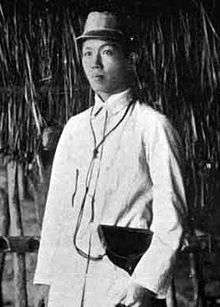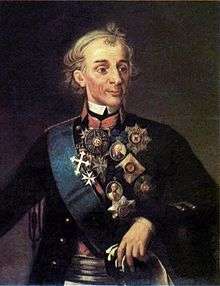Generalissimo
Generalissimo (Italian: Generalissimo [dʒeneraˈlissimo], Spanish: Generalísimo [xeneɾaˈlisimo], Portuguese: Generalíssimo [ʒenɨɾaˈlisimu], French: Généralissime, Latin: Generalissimus) is a military rank of the highest degree, superior to field marshal and other five-star ranks in the countries where they are used. The word generalissimo is Italian and is the absolute superlative of generale ('general'), thus meaning "the highest-ranking of all generals".
Notable examples of generalissimos include John J. Pershing of the American Expeditionary Forces, [1] Chiang Kai-shek, who was the leader of the Republic of China from 1938 to 1975, [2] Alexander Menshikov of the Russian Imperial Army (1727–1728),[3] Miguel Hidalgo y Costilla of the Revolutionary Army of Mexico (1809–1811),[4] Kim Jong-Il of the Korean People's Army (1991–2011),[5] George Washington of the Continental and United States Armies (1775–1799 and 1798–1799, respectively),[6] Francisco Franco of the Spanish Armed Forces (1939–1975),[7] Maxime Weygand of the French Army (1939), Emilio Aguinaldo of the Philippine Revolutionary Army (1898–1901),[8] Karl Philipp, Prince of Schwarzenberg, and Charles XIV John of Sweden of the Royal Swedish Army (1810–1811).[9]
Usage
The word "generalissimo" is an Italian term, from generale, plus the superlative suffix -issimo, itself from Latin -issimus,[10][11][12][13][14] meaning "utmost, to the highest grade".
Historically this rank was given to a military officer leading an entire army or the entire armed forces of a nation, usually only subordinate to the sovereign.[15] Other usage of the rank has been for the commander of the united armies of several allied powers.
The rank Generalissimus of the Soviet Union would have been a generalissimo but Stalin refused to adopt the rank.[16][17]
List of generalissimos

| Person | Service | Country | Era | Notes |
|---|---|---|---|---|
| Chiang Kai-shek | National Revolutionary Army | Republic of China | 1935 | His rank was Tèjí Shàngjiàng (特級上將), or "General Special Class"[18] |
| Karl Philipp, Prince of Schwarzenberg | Imperial and Royal Army | Austrian Empire | 1813 | He was the Commander of the armies of the Sixth Coalition in the Battle of the Nations, which was the largest battle in history to that point with 225,000 soldiers and 700 guns on the Napoleonic side and 380,000 soldiers and 1,500 guns on the Sixth Coalition side. |
| Joffre, JosephJoseph Joffre | French Army | France | 1914 | His rank was Marshal of France, but his title as commander-in-chief of the French Army was généralissime. |
| Suvorov, AlexanderAlexander Suvorov | Russian Imperial Army | Russian Empire | 1799 | |
| Menshikov, Alexander DanilovichAlexander Danilovich Menshikov | Russian Imperial Army | Russian Empire | 1727–1728 | [3] |
| Foch, FerdinandFerdinand Foch | French Army | France | 1918 | Généralissime was the title used to describe Ferdinand Foch's Allied Command, starting 26 March 1918. He actually held the rank of général de division, Marshal of France and later the ranks of British Field Marshal and Marshal of Poland.[19] |
| Gamelin, MauriceMaurice Gamelin | French Army | France | 1939 | His rank was général d'armée, but his title as commander-in-chief of the French Armed Forces was généralissime. |
| Weygand, MaximeMaxime Weygand | French Army | France | 1939 | His rank was général d'armée, but his title as commander-in-chief of the French Armed Forces was généralissime. |
| de Miranda, FranciscoFrancisco de Miranda | Venezuelan Army | Venezuela | 1812 | |
| Hidalgo y Costilla, MiguelMiguel Hidalgo y Costilla | Revolutionary Army of Mexico | América Mexicana | 1810 September – 1811 February | [4] |
| de San Martín, JoséJosé de San Martín | Peruvian Army | Perú | 1821-1822 | Founder of the Freedom of Perú, Founder of the Republic, Protector of Perú and Generalísimo de las Armas del Perú |
| Franco, FranciscoFrancisco Franco | Spanish Armed Forces | Spain | 1936–1975 | generalísimo[7] |
| Emilio Aguinaldo | Philippine Revolutionary Army | Philippines | 1898–1901 | Heneralismo[8] |
| Ihsan Nuri | Ararat Forces | Kurdish Republic of Ararat | 1927–1930 | [20] |
| Crown Prince Charles John | Royal Swedish Army | Sweden | 1810–1818 | [9] |
| Stalin, JosephJoseph Stalin | Soviet Armed Forces | Soviet Union | 1945 | Generalissimus of the Soviet Union[21] (declined) |
| Kim Il-sung | Korean People's Army | North Korea | 1992 | Taewonsu[22] |
| Kim Jong-il | Korean People's Army | North Korea | 2012 | Taewonsu (Promoted posthumously)[5] |
| Trujillo, RafaelRafael Trujillo | Dominican Army | Dominican Republic | 1930 | [23] |
| Sun Yat-sen | National Revolutionary Army - Warlord Era (Northern Expedition) | Republic of China | 1921 | Technically as da yuan shuai or grand marshal[24][25] |
| Albrecht von Wallenstein | 30 Year's War | Holy Roman Empire via the "Principal Decree of the Imperial Deputation"[26] | 1625 | [27] |
| Pershing, John J.John J. Pershing | United States Army | United States of America | 1919 | Promoted to General of the Armies of the United States on September 3, 1919.[1] |
| Washington, GeorgeGeorge Washington | Continental Army United States Army | United States of America | 1776 | Promoted posthumously to General of the Armies of the United States on January 19, 1976 with date of rank of July 4, 1976.[6] |
| da Fonseca, DeodoroDeodoro da Fonseca | Brazilian Army | Brazil | 1890 | First president of Brazilian Republic and responsible for the fall of the Brazilian empire. |
| Kalākaua | Hawaiian Army | Kingdom of Hawaii | 1886-1891 | King of Hawaii, was given titles of "Supreme Commander and Generalissimo of the Hawaiian Army." Titles were to be given to Kalākaua's brother-in-law, John Owen Dominis, on however both titles were abolished.[28] |
See also
- Commander-in-chief
- Field marshal
- Highest military ranks
- Generalissimus of the Soviet Union
- Caudillo
- General of the armies
- Admiralissimo
Notes
- ↑ Chiang Kai-shek was a 特級上將 ("general special class") of the Republic of China, cf. 特級上將授任條例
- ↑ The Napoleonic Marshal of France Jean Baptiste Bernadotte, Prince of Ponte Corvo, was elected Crown Prince of Sweden by the Riksdag of the Estates and King Charles XIII in 1810. Given his exalted French military rank, the rank of generalissimus was likely granted him in order to give him precedence over "mere" Swedish field marshals. Once he became King of Sweden and Norway in 1818, the generalissimus rank became superfluous.
References
- 1 2 Public Law 66-45 of September 3, 1919 to revive the office of General of the Armies
- ↑ Jonathan Fenby (12 February 2015). Generalissimo: Chiang Kai-shek and the China He Lost. Simon & Schuster UK. ISBN 978-1-4711-4295-6.
- 1 2 "Menschikow und Stalin waren die einzigen Heerführer der russischen Geschichte, die sich "Generalissimus" nennen ließen." [Menshikov and Stalin were the only military leaders in Russian history who declared themselves "generalissimus".] Jena, Detlev (1996): Die russischen Zaren in Lebensbildern, Graz, p. 520.
- 1 2 Comunica Miguel Hidalgo su proclamaci n como General simo de Am rica. Documentos Historicos de Mexico, 24 Oct 1810.
- 1 2 The Australian, 15 February 2012, Late Kim Jong-il awarded highest honour by North
- 1 2 Public Law 94-479 of January 19, 1976 to provide for the appointment of George Washington to the grade of General of the Armies of the United States
- 1 2 Cover, TIME magazine, 18 Oct 1943
- 1 2 Emilio Aguinaldo. Biography.com. Retrieved 16 August 2015.
- 1 2 (in Swedish) Ancienneté och Rang-Rulla öfver Krigsmagten år 1813
- ↑ Webster's Third New International Dictionary., French Larousse Étymologique.
- ↑ "Online Etymology Dictionary". Online Etymology Dictionary.
- ↑ "Define Generalissimo at Dictionary.com". Reference.com.
- ↑ "Generalissimo – Definition and More from the Free Merriam-Webster Dictionary". Merriam-Webster.
- ↑ "Definition of generalissimo – Oxford Dictionaries (British & World English)". Oxford Dictionary of English.
- ↑ Thomas Hobbes (1660), Chapter XVIII: Of the Rights of Sovereigns by institution, retrieved 16 August 2015
- ↑ Service, Robert (2005). Stalin: A Biography. Cambridge: Harvard University Press. p. 548. ISBN 978-0-674-01697-2.
- ↑ S. M. Shtemenko. The General Staff in the War Years. Moskva 1985. Vietnamese version (vol. 2) . pp. 587-588.
- ↑ Jay Taylor:The Generalisimo:Chiang Kai-shek and the struggle for modern China (2009) Harvard Press
- ↑ John McGroarty :The Gray Man of Christ: Generalissimo Foch (1919) Los Angeles, Walter A Abbott
- ↑ Bletch Chirguh, La Question Kurde: ses origines et ses causes, Le Caire, Impimerie Paul Barbey, 1930, front cover, IHSAN NOURI PACHA Généralissime des forces nationales Kurdes (in French)
- ↑ Joseph Stalin was appointed Generalissimus of the Soviet Union. See: Ivan Aleksandrovich Venediktov, Selskokhozyaystvennaya yentsiklopediya, Vol. 4, Gos. izd-vo selkhoz, 1956, p. 584. (in Russian)
- ↑ The Daily Yomuiri, 29 September 2010, Kim Jong Un spotlighted / 'Heir apparent' promoted to general, makes DPRK media debut
- ↑ Stanley Walker, Generalissimo Rafael L. Trujillo (1955) Caribbean Library
- ↑ Linda Pomerantz-Zhang (1992). Wu Tingfang (1842–1922): Reform and Modernization in Modern Chinese History. Hong Kong University Press. p. 255. ISBN 962209287X. Retrieved 2010-10-31.
- ↑ Taylor, Jay (15 April 2009). The Generalissimo: Chiang Kai-shek and the struggle for modern China. Harvard University Press. p. 32. ISBN 978-0-674-05471-4. Retrieved 28 February 2017.
- ↑ A short history of Germany. Ernest Flagg Henderson, 1908
- ↑ Tilly und Wallenstein – ein Vergleich zweier Heerführer. Harry Horstmann, 2010. (in German)
- ↑ Chapter XXII: Act Act To Organize The Military Forces Of The Kingdom. Laws of His Majesty Kalakaua, King of the Hawaiian Islands: Passed by the Legislative Assembly at Its Session of 1886. Honolulu: Black & Auld. 1886. pp. 37–41. OCLC 42350849.



